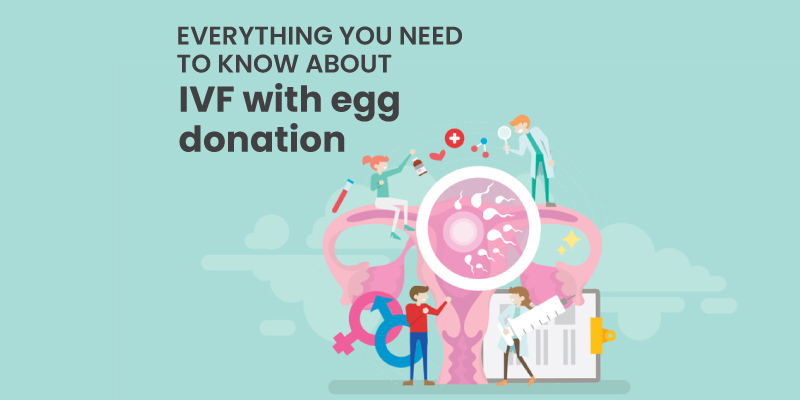Author: Dr. Sai Manasa Darla, Consultant, Fertility Specialist & Laparoscopic Surgeon
For women with low ovarian reserve (number of fertile eggs present in the ovaries), or those with low-quality eggs, IVF with egg donation is a breath of relief. IVF with egg donor process helps couples to achieve their dream of parenthood.
What is IVF with egg donation?
IVF with egg donation is an assisted reproductive technology. It utilizes the mature eggs that are collected from an anonymous egg donor. These retrieved eggs are then fertilized with the male partner’s sperm. Upon fertilization, the resulting embryo is transferred into the recipient’s uterus to be implanted.
Who requires IVF with egg donation?
IVF with egg donation is recommended for women who are suffering from the below-mentioned indications:
– Premature menopause
– Premature ovarian failure
– Repeated failed IVF procedures
– Medical conditions and treatments such as Cancer and chemotherapy
– Hereditary and congenital issues.
What are the criteria for an egg donor?
The criteria for a woman to be an egg donor are stipulated in The Assisted Reproductive Technology (Regulation) Bill, 2021. It is important to know that egg donation in India is an anonymous process.
– The egg donor has to be a healthy woman between 23 and 35 years of age.
– An egg donor can only donate eggs once in her lifetime and no more than 7 eggs should be retrieved.
– An ART bank shall obtain all necessary information in respect of an oocyte donor, including the name, Aadhaar number, address, and any other details required.
– The gamete of a donor shall be stored for not more than ten years and at the end of such period such gametes shall be allowed to perish or be donated to a research organization registered under this Act for research purposes with the consent of the couple or individual.
– Medical examination of donor: The donor shall be tested for the following communicable diseases, namely Human Immunodeficiency Virus (HIV) both type 1 and 2, Hepatitis B virus (HBV), Hepatitis C virus (HCV), Treponema pallidum (Syphilis) through VDRL
– A donor shall relinquish all parental rights over the child or children who may be born from her gamete.
What is the process of IVF with egg donor?
IVF with egg donor process can broadly be divided into:
1. Recipient evaluation
A basic evaluation is done by the fertility specialist. The evaluation consists of tests to identify any abnormalities that could interfere with the procedure.
The tests include:
– Ultrasound examination to find abnormalities in the uterus
– Basic blood tests (Hormone profile, complete blood picture, etc.)
– Screenings such as Pap Smears and Mammograms
2. Donor selection
Donor will be selected from the egg donor profiles which will be shared with the recipient couple.
As mentioned, the donor will be anonymous. Physical attributes such as ethnicity, hair color, eye color, and other basic details such as education and job will be shared with the recipient.
3. Syncing the donor and recipient’s menstrual cycles
The recipient’s and the egg donor’s menstruation cycles are synchronized in an IVF with egg donation procedure. This is usually done using birth control pills. Once a donor is picked the recipient woman is put on a prescribed dose of estradiol tablets to sync their respective menstrual cycles to prepare the recipient woman’s uterus for embryo transfer from the second day of her period. And the donor is given hormonal injections for ovarian stimulation.
4. Egg collection process from an egg donor
Ovarian stimulation of the donor
The egg donor is put on hormonal medications that stimulate the ovaries to produce multiple mature eggs.
The egg retrieval process from the donor
After ovarian stimulation, the ovarian follicles are triggered for oocyte maturation. It is important to know that the ovaries are triggered only after reaching an appropriate and desired follicle size. Following the maturation process, which typically takes 11–12 days, the egg collection process or egg retrieval process is done under anaesthesia along with ultrasound guidance.
5. In Vitro Fertilization:
How are eggs fertilized after retrieval?
A semen sample is collected from the recipient’s partner on the day of egg collection process. The retrieved eggs are then allowed to fertilize under controlled lab conditions with the sperm sample.
In a few instances such as low sperm count or low motility rate of the sperm, ICSI is done to aid fertilization. ICSI (intra cytoplasmic sperm injection) is a method wherein the best sperm is collected from the sample and injected into the oocyte.
3 to 5 days after fertilization, the resulting embryos are grown up to the blastocyst stage before transferring to increase the chances of implantation and successful pregnancy.
Any surplus embryos formed can be frozen for future purposes in case of a failed procedure.
6. Endometrial preparation of the recipient and embryo transfer:
The recipient is prescribed luteal support medications to aid embryo implantation.
1 or 2 healthy embryos are transferred into the recipient’s uterus with the help of ultrasound guidance.
7. Pregnancy test:
A blood pregnancy test is done after the two week wait period following embryo transfer to check if the procedure was a success or not. HCG levels in the blood are measured to determine the pregnancy result.
Take away:
IVF with egg donation is a hope for women who cannot achieve motherhood due to various reasons. Although, it is important to know that the success rate of IVF with egg donor depends on both recipient and donor variables. Recipient factors that affect are age, endometrial thickness, body weight, uterine conditions, quality of embryo, etc. Donor factors include age and the number of mature oocytes retrieved. Consult with our expert fertility specialists today to know your options regarding IVF with egg donation.

